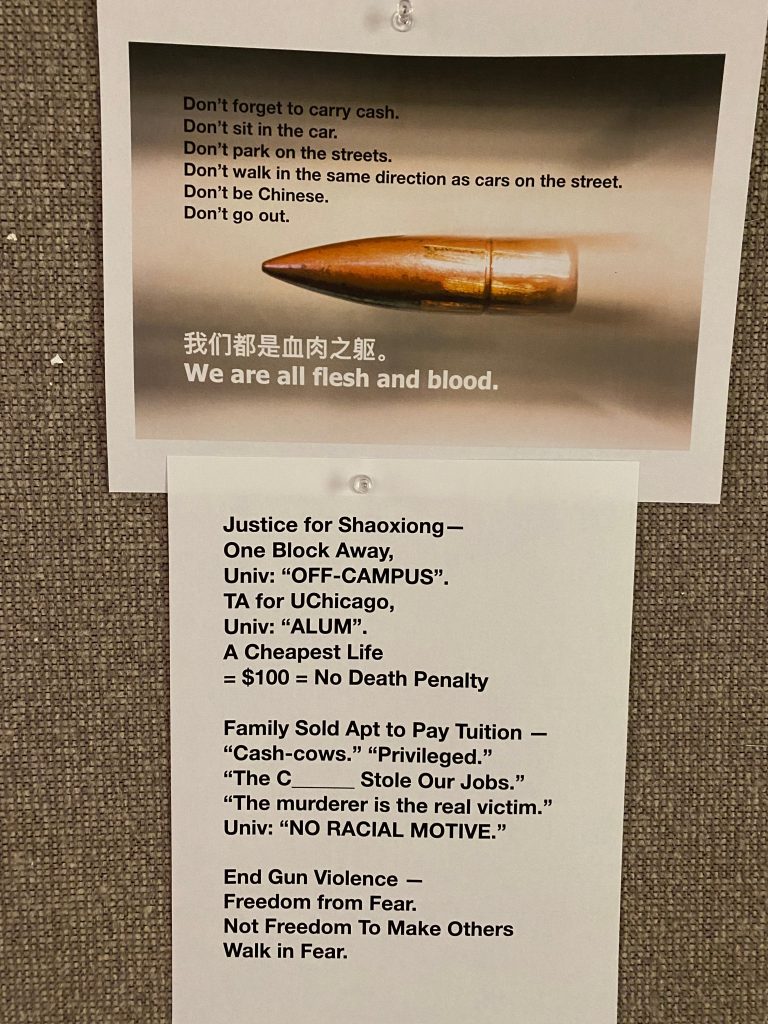Yesterday Judith Butler came and gave an in-person lecture on the implications of the ending of Aeschylus’s Eumenides (The Furies, last play in the Oresteia trilogy). She was, as usual, dry, witty, persistent, demanding — a speaker who invigorates and reminds us of how good an event an academic talk can be. The house was full. A livestream accommodated the overflow (I’ll link to it when it’s posted). I was lucky to get one of the last seats.
The problem Butler addressed was: what really happens at the end of the play? Supposedly the raging Furies, demanding blood for blood and crime as payment for crime in the first two plays of the trilogy, become tamed in the third after Orestes is acquitted for the murder of his mother (actually not his mother, in the sophistical argument of the defense*). Although they have threatened to “spread poison through the land” if their demands are not heard, Athena placates them with an offer of an honored position in the city:
ἔξεστι γάρ σοι τῆσδε γαμόρῳ χθονὸς
εἶναι δικαίως ἐς τὸ πᾶν τιμωμένῃ.
…
πάσης ἀπήμον᾽ οἰζύος: δέχου δὲ σύ. (890 ff)
That is, “You have the chance to become settlers in this land, justly honored forever more… and relieved of all pain: accept this offer.”
The Furies do accept the offer, according to Aeschylus, and agree to delay their demands for vengeance, redirecting their anger into the public forum: accusation, trial, and punishment will now take the place of pursuit and murder. Athena sees the advantage in this alliance with her erstwhile antagonists:
ἐκ τῶν φοβερῶν τῶνδε προσώπων
μέγα κέρδος ὁρῶ τοῖσδε πολίταις. (990-991)
“From their terrifying faces I can see a great benefit to come for these citizens.” Better to have them inside the tent, as the political saying goes. Now at this point Butler switches to discussion of classicists’ commentaries on the passage. Kitto, seeing here a foundational moment of civilization, applauds the new deal as the emergence of light and goodness from irrational (and feminized) passions, the victory of right over force, of law over lawlessness; Butler is not so sure. For the passions certainly remain passions even if redirected. The faces of the Furies are still “terrifying.” And what does terror come from? Imbalance of power. Athena knows what she’s doing: earlier she asked, τίς γὰρ δεδοικὼς μηδὲν ἔνδικος βροτῶν; (“can a mortal who fears nothing ever be just?”). Fear, transformed into reverence, is the very basis of religion, the atmosphere in which the gods bathe. Butler sees the ambivalence of this situation: as Freud has taught us, when we drive a desire out of our conscious minds, it is apt to reappear somewhere else, as symptom or sublimation. Where have the Furies gone?
They have gone, as Butler sees it, into the apparatus dedicated to preserving the majesty and terror of the law. Police, courts, prisons stand as perpetual threats discouraging us from going astray. You might think that the law stands over against violence, protects us from violence, but law incorporates violence, is in its essence violent. Here Butler cited law-review articles by Paul Gewirtz and Robert Cover that confess this fact. I haven’t looked up the Gewirtz, but Cover’s contribution was the famous “Violence and the Word,” Yale Law Journal 95 (1986) 1601-1629. She cited with a raised eyebrow and delicate sarcasm the passage where Cover says:
The act of sentencing a convicted defendant is among [the] most routine of acts performed by judges. … If convicted, the defendant customarily walks — escorted — to prolonged confinement, usually without significant disturbance to the civil appearance of the event. It is, of course, grotesque to assume that the civil façade is ‘voluntary’ except in the sense that it represents the defendant’s autonomous recognition of the overwhelming array of violence ranged against him, and of the hopelessness of resistance or outcry…. If I have exhibited some sympathy for the victims of this violence it is misleading. Very often the balance of terror in this regard is just as I would want it. (1607-1608)
Then Butler shifted to contemporary issues: the carceral state, the murder of innocent civilians, mostly Black or Brown, by police officers, the question of whether due process is required or insufficient in the context of #MeToo accusations. She concluded with a summons to reform the prison system, to make prisons places where inmates are educated, not left to rot or to marinate in violence — maybe this is the way, finally, to deal with the Furies, by education.
I agree with her condemnations and I endorse her endorsements. I think any decent person would. Violence performed in the name of the state should fall under extreme scrutiny, because it is done in our names and engages us, the citizens. “The monopoly on the legitimate use of force” (Weber, Politics as Vocation, 1919) has long been recognized as a defining characteristic of the state — but that means it must undergo a legitimating process, not be wielded arbitrarily.
And this is where Butler’s scenario seems to me to have fallen apart. Yes, what passes for peace and order in any state is built on fear and repression, as Athena recognized in addressing the furies. Peace relies on violence or the threat of violence. But the men in blue who killed George Floyd or the suburban busybodies who killed Trayvon Martin, Ahmaud Arbery, and so many others, were not legitimately carrying out a state interest. It is important to say this. Wearing the uniform does not confer license to kill. Shouting “citizen’s arrest” does not sanctify your murderous intent. Police unions and juries have for too long banded with the offenders in these cases and kept them from being prosecuted for actions that in any other situation would be recognized as crimes. Such protection networks define mafias, which should not be confused with the state, unless we are ready to give up on the idea of legality altogether (if that seems attractive, I recommend you take a study tour of the major kleptocracies, list available on demand).
Violence is not simply or even preeminently exercised by state actors. The example to which Butler’s reading of Aeschylus allusively led spotlights only such cases (though, as I’ve just mentioned, some of the most egregious are not proper examples). Yes, we need to be attentive to legal violence and minimize it. We need to be attentive to pseudo-legal violence and prosecute it, as a way of making clear the difference between it and the authority it misappropriates. But even if we do so, we will not have eliminated violence in this country. It surrounds us and threatens us, makes us live in fear, not of the law but simply of our neighbor. It was particularly painful to notice the partial spotlighting of Butler’s talk inasmuch as she was speaking in Chicago, two days after the cold-blooded murder, by gun, of a young man on a street two blocks from campus. That young man, (Dennis) Zheng Shaoxiong 鄭少雄, died not by reason of any state action, but… No, I went too fast. He would not have met this death so easily if it were not for a particular federal action in repression of a state and city code that might have saved his life and many more.
I refer to attempts by the City of Chicago and the State of Illinois to regulate the possession of firearms, attempts repeatedly batted down by the Supreme Court in the name of the Second Amendment. I would say that state and city strove to pit law, with its inevitable violence, against the violence of lawlessness. They failed when a superior authority voted on the side of lawlessness. “The right to bear arms shall not be infringed.” And so we are all left living under the gun, in a climate of fear that makes none of us wiser or more virtuous.
By personality, education and friendships, I feel a particular affinity to the Chinese students who come to this country to sharpen our wits and theirs, to experience a different kind of life, to burnish their qualifications, to prepare for a crushing competition for success in their professions. Zheng Shaoxiong was not the first young Chinese man to be killed in an arbitrary confrontation on the borders of the University of Chicago campus in the last few years. The Chinese students I have spoken with see a pattern. It is a pattern of exposure to random, senseless violence activated and energized by the availability of high-performance weapons — exposure heightened by bias.
And similarly, as we have seen, we who read the papers, that availability makes it possible for any aggrieved worker, any complaining incel, any resentful or depressed person to pull out a credit card, acquire a semi-automatic (or a dozen!), and join the band of the Furies. I had not expected Butler to come out in favor of the Second Amendment (nor, I think, did she; I am just drawing the unexpected consequence, for which I beg pardon), but when she cites mockingly Cover’s rather candid admission that in a well-ordered state “the balance of terror… is just as I would want it to be,” perhaps throwing shade at him for being too comfortable with that state of affairs, the implication is that a less lopsided balance of terror would be fairer somehow. Exactly what the stockpilers of AK-47s, the Sovereign Citizens, the flyers of the Gadsden Banner, the doomers, preppers, and adherents of “Q” would like to think. Now indeed if it were possible to reestablish effective arms control, that would be a step toward a “balance of terror… as I would want it to be.” I don’t think my wishes in this regard are particular to the subset of the population that shares my skin color, educational level, residential zone, or income bracket. Some countries experience ideologically-based terror from organized bands; in America, land of do-it-yourself, we just declare a free-fire zone and watch the show.
It’s a terrible situation and it doesn’t lend itself to good-versus-evil, underdog-versus-baddie schematization. Are the victims of this violence outside the law “ungrievable”? (For the term, see Butler, Antigone’s Claim.) Not to me.
- Reason to declare a mistrial: as Athena admits, she, the judge, never had a mother, so she doesn’t even know what one is. And note that the jury’s vote is 50/50, with Athena casting the deciding ballot. Shaky jurisprudence indeed, especially when taken as foundational.





